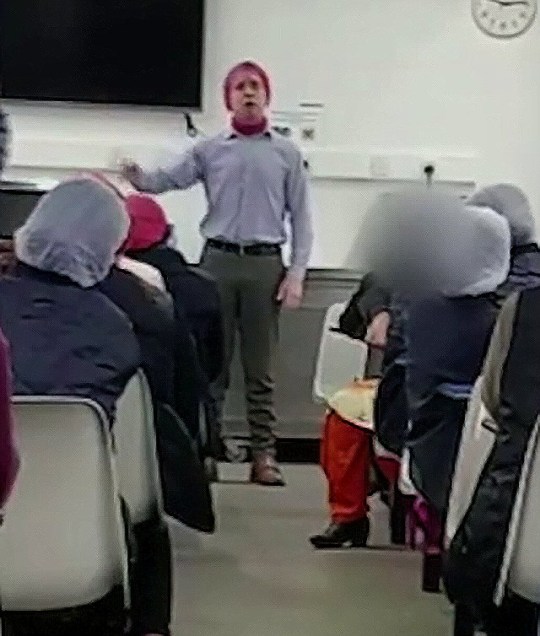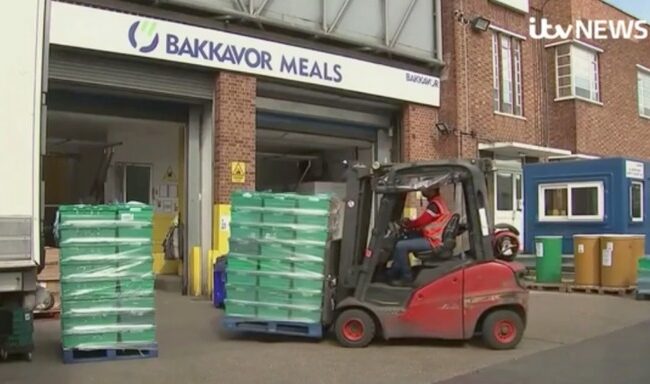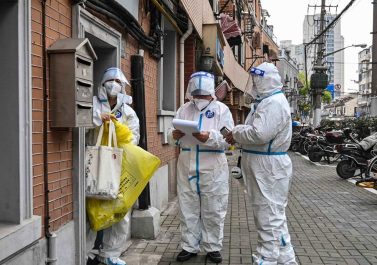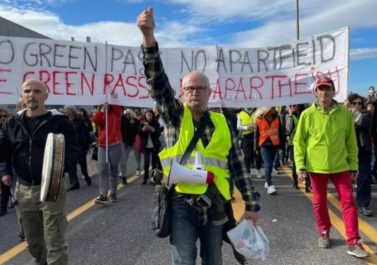Naming and shaming bad employers is de rigueur in the times of Corona. Just last week, the bigwig at my former workplace, a ready-meals factory in west London owned by Bakkavor, was secretly recorded threatening workers with the sack if they stayed at home ‘on sick leave.’ [1] We see the Bakkavor manager politely and oh so rationally admitting the company’s inability to protect them through social distancing inside the factory, and then saying they will be sacked if they decide to protect themselves if they choose to stay at home instead. For any current or recent employee, this was not at all surprising, given the toxic bullying culture endemic across all three of these factories in Park Royal and which has been left largely unchallenged by a weak union and even weaker workforce. [2] The fact that this bigwig felt totally confident to threaten a canteen full of workers in the middle of a pandemic where all eyes are on such ‘essential’ industries and their workforces, shows just how complacent the management is that workers will accept whatever shit is thrown at them.

But the other aspect to this shitstorm is the fact that Bakkavor management here are in real trouble. Their threats come from a place of instability: despite orders being down 40%, they still have problems getting enough workers to actually do the work. In the secret recording, the manager admits that 45% of the workforce are off sick. At the Cumberland site we’ve heard that a quarter of the workforce are off, meaning that some of the work has had to be redirected to other sites. Adding to their misery is the effect of years of their penny-pinching efficiency drives that have resulted in fewer full-time employees taking on the work of two or three people. The lower numbers of (mainly Eastern European) agency workers to fill the gap because of Brexit probably hasn’t helped matters either. The usual ‘stick’ approaches – threats, bullying, shouting, intimidation and manipulations – that are commonplace in such low-paid workplaces, have now backfired, and Bakkavor are on the back foot. Workers, in large numbers, are voting with their feet and refusing to come to work under the current conditions.
A worker took the chance opened up by the shifting balances of power that Corona has brought with it, to film this manager. The ‘public’ now gets a glimpse of the regular disrespect faced by workers in low-paid, undervalued jobs like this. All this talk of ‘essential’ workers means little if workers are not able to use their power in these moments to demand better pay and conditions. In this case, the lack of experiences of unity amongst the workers, is self-evident, as collective demands have not been made and many workers still come into work, sitting shoulder to shoulder in the canteen, without masks. Many workers are older and have underlying health conditions, which makes the situation worse. But in the absence of a workers’ confidence in such workplaces, ‘sick-outs’ like this send a strong message that workers have a limit to what they will put up with, and act according to their means.
At the same time, these worker absences haven’t really been ‘co-ordinated.’ Does this matter when the company suffers just the same? In the long-run, we think it does. Individual responses to a collective issue, even if they happen en masse ultimately need to coalesce into an active, conscious and collective resistance against the unacceptable choice that is always imposed on workers at some point, namely between a wage and their health. Why? Because it is only when workers gain an insight into their collective strength can they start asking more fundamental questions about their role in a producing a different society.
This may sound a bit abstract so let’s throw out a couple of examples. Workers at the Porto Marghera petrochemical plant in Italy in the 70s refused the union strategy for ‘danger money’ (meaning a bonus payment for the more dangerous elements of the work) and organised a campaign and strikes against the dangerous health conditions, ending up closing parts of the plant that the management had previously said couldn’t be stopped without it being destroyed. [3] More recently at the ILVA steel plant in Taranto in Italy workers and the local population demanded the closure and refurbishment of the plant to include things like installing modern air filters and paying peoples’ wages in the meantime. Other groups of workers start questioning their role and function under capitalism, for example, with the slogans to ‘refuse work’ by militant workers, again in Italy in the 70s, or more recently Google workers opposing their work being used for the war industry and militarisation. However, getting to the point where a workforce feels strong enough to do this, is a difficult task, made even worse by the current situation where migrants feel more precarious due to Brexit, and the government’s policies of low-waged expansion have had many years to entrench themselves and disempower workers. We cannot afford to bury our heads in the sand over these barriers.
Unions have not been up to the task to fight back against this retrenchment. I won’t start on the union axe-grinding in this article, but it’s telling that most of the recent action by workers in the low-paid food sector have circumvented the unions entirely. The most recent case is the 2Sisters meat factory in Devon last week, where 170 (mainly Romanian) employees out of 1000 failed to show up for work to demand higher wages and better conditions. [4] When a similar ‘unofficial’ action happened at one of London Bakkavor factories last year (workers failed to turn up to work en masse on a bank holiday to protest against the low pay offer), the union was quick to publicly denounce the action to all workers. This was despite the fact that it was this singular incident that put the most pressure on management to actually give a bigger pay increase. Even as we speak, the union at FIAT in Italy is negotiating a return to work with management. [5]
Unions’ inability to support such actions are understandable given that they cannot afford to be seen as ‘losing control’ of the workforce and thus undermining their legitimacy and union recognition agreements. At the same time, doing things within the framework of the law is too restrictive to actually get anything done in a way that builds momentum amongst the workforce. In light of the increasingly limited space for workers to act quickly and decisively, wildcat actions seem to be making a bit of a comeback. In our book, Class Power on Zero-Hours [6], we write:
“In spring 2018, Moy Park workers in Northern Ireland, who provide chicken to the big supermarket chains, won a 4% pay increase [much larger than the 2% food sector average], but only after they took unofficial action by walking out of the factories…In December 2018 there was a wildcat strike of meat processing workers at the Cranswick [meat factory] factory in Preston…In July 2019, near processing workers at Karro Foods, owned by CapVest too unofficial action by protesting outside their factory in Malton when they discovered workers at a rival business were getting more money for them for doing the same job. They demanded 50p more an hour but their actions were not supported by the shop-workers union, USDAW…”
The same Moy Park workers staged a walkout a few weeks ago in protest against the lack of social distancing measures taken by the company.
Despite an uptick, this kind of thing is still marginal. In general, workers are deciding either to go off sick, or go on Universal Credit as employers wash their hands of the responsibility. In this vacuum of conscious and collective workers’ power, the media play an even bigger role in their ‘naming and shaming’ game, with companies coming under attack for 24 hours before the rapid news cycle turns it into ‘yesterday’s news’ even before the 24 hours are up. The dust settles and managers like this Bakkavor guy are either brought back, newly atoned in the glow of their ‘new training’, or another douche is brought in to replace them. The next step would be for workers to start demanding their due: full company protection (masks and distancing) or if not, full factory closure on full pay. We have circulated the following message (in English, Gujarati and Tamil) to Bakkavor workers through whatsapp:
“Bakkavor is on TV. Now everyone can see how they treat their workers.
Corona kills people.
Bakkavor should:
Give workers full security (proper mask) and observe 2 meters inside the factory.
If they cannot do this, they should close the factories and pay the workers a full wage!
Share this news and take action!”
It is up to the workers to share, discuss and act on it. Spontaneity in this kind of repressive work atmosphere is no small undertaking and we can’t be voluntaristic about it. But hopefully, this wake up call will lead some workers to start questioning the dissonance between their supposedly ‘essential’ status, and their treatment, so that when the next crisis hits, they are in a better situation to fight back.
******
We want to help reconstitute the revolutionary working class left to orient itself around practice like this, that encourages workers’ self-organisation in tough times. If you want to join us in our next discussion, email us for the details of our next zoom call on Tuesday 14th April at 7.30pm at:
angryworkersworld@gmail.com
If you are interested in the international debate, check out the new FEVER struggle website: https://feverstruggle.net/
[1] https://www.itv.com/news/2020-04-09/coronavirus-bakkavor-boss-threatened-to-sack-staff-who-miss-work-amid-outbreak/
[2] https://www.vice.com/en_uk/article/z3bdzx/revealed-the-bullying-allegations-and-bad-conditions-behind-your-favourite-ready-meals
[3] https://libcom.org/history/porto-marghera-%E2%80%93-last-firebrands
[4] https://www.devonlive.com/news/devon-news/devon-2-sisters-factory-hit-4028476
[5] https://auto.economictimes.indiatimes.com/news/passenger-vehicle/cars/fiat-reaches-deal-with-unions-on-measures-for-production-restart-in-italy/75077887
[6] https://pmpress.org.uk/product/class-power-on-zero-hours/



